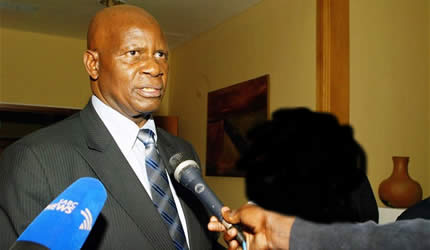‘Bold measures needed to prop up economy’

Golden Sibanda Senior Business Reporter
There is need for immediate multi-sectoral efforts to come up with bold corrective measures to prevent the economy from sliding further into a decline, a Reserve Bank official said. RBZ divisional chief, economic research and policy enhancement, Mr Simon Nyarota said all economic agents should work together to identify a corrective action plan to halt further decline into negative growth mode.
Mr Nyarota made the remarks in his keynote presentation after the Confederation of Zimbabwe Industries’ annual general meeting in the capital yesterday.
According to the RBZ, the economy is now projected to grow by an average of 3,1 percent from the 6,1 percent Finance and Economic Development Minister Patrick Chinamasa had forecast in his 2014 National Budget.
“Economic activity is going down from the 10,5 percent growth in 2011 to 3,1 percent that we are anticipating in 2014. If we do not do anything we are going into negative territory in the next one to two years.
The economy is buckling under the pressure of a cocktail of challenges that include the high cost of labour, electricity, shortage of raw material, external competition, high cost of water, deteriorating infrastructure and high cost of mostly short-term bank credit.
“In other words, economic activity is going to decline and it would be similar to 2007 to 2008, but this could be worse because we do not have an economic (monetary) policy to stabilise the economy,” Mr Nyarota said.
The RBZ divisional chief said the graph of economic trajectory since 1990 showed troughs of boom and slow down, which called for anti-cyclical policies to cushion the economy during periods of depressed performance, sometimes due to frequent drought spells.
Industrial output has declined from an average of 54 percent in 2011, the all time high since dollarisation in 2009, to 44,9 in 2012 and about 39,6 percent last year amid grim prospects that firms’ capacity utilization could decline further this year.
Over 2 300 workers lost their jobs last year after 165 companies embarked on staff rationalisation programmes.
However, the majority have since found comfort in an informal sector threatening to upset the established order of local industrial and retail behemoths. A total of 2 376 people also lost their jobs in 2012.
Government is unable to use instruments such as the monetary policy to stimulate economy because after scraping local currency at the height of economic problems in 2009 and adopted a basket of currencies dominated by the greenback.
Mr Nyarota said while Government has come up with the Zimbabwe Agenda for Sustainable Socio-economic Transformation 2014/18 to counter deceleration, all stakeholders in the economy should, collectively, identify bottlenecks for the policy to succeed.
He said Zim-Asset’s “success depended on awareness and full participation of all economic agents” including Government, public enterprises, private and social sectors.
He said that there was need to identify all economic structural bottlenecks that have inhibited consistent and sustainable economic growth since the early nineties.
Confederation of Zimbabwe Industries president Mr Charles Msipa said industry was largely constrained by high cost of labour, expensive electricity, high cost and limited availability of raw material and high cost of funding for short term credit.
“What we need is to redouble our efforts as economic agents to rebuild confidence in our economy so that we can attract the capital inflow to make it possible for people to get funding at the cost they afford,” the lobby group’s boss said.
He said the country’s biggest challenge was access to long term funding.
Deposits have also become transitory in the banking sector due to low income levels and lack of confidence in the sector resulting in low levels of savings and deposits while the country cannot service its debts.
Domestic industry is also afflicted by poor infrastructure namely air transport, road and rail network and old plant/machinery no fresh capital investment has been injected in over a decade, which has eroded competitiveness of companies.









Comments